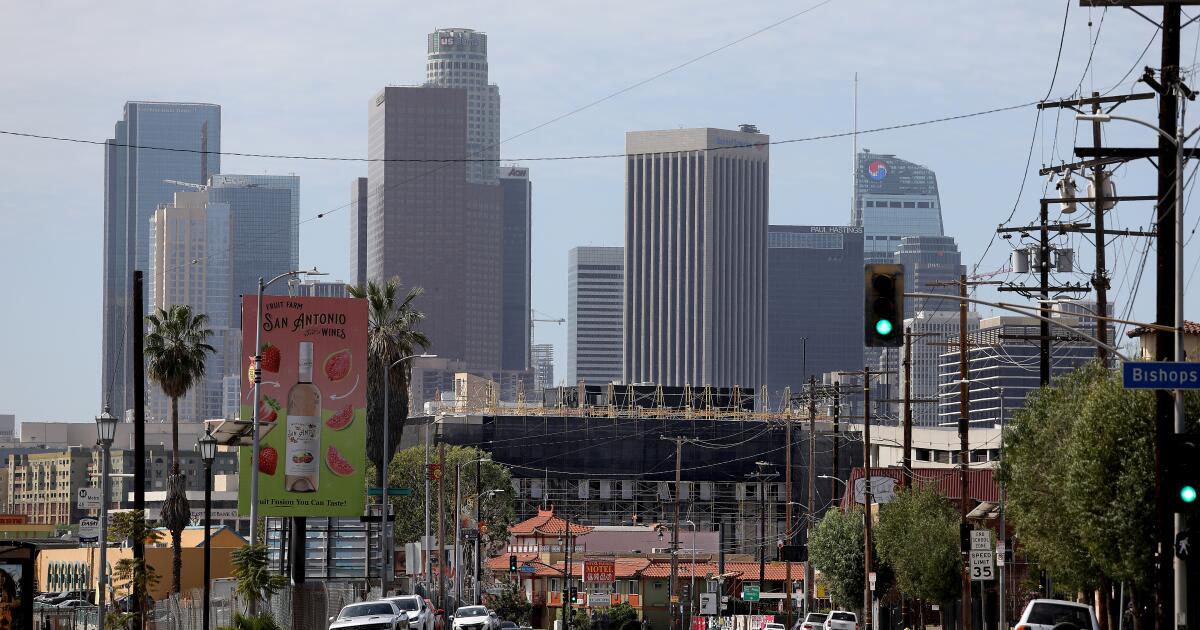Comment: Mayor doesn’t have much to say about the new Dodger Stadium EIR gondola
The Los Angeles City Council defied Mayor Karen Bass last week, overwhelmingly passing a resolution urging Metro to kill the proposed Dodger Stadium gondola and urging Bass to lend her support.
The Metro Commission looked into the gondola project Thursday, and Bass happened to be one of the five voting members of the commission. In front of hundreds of community members attending the hearing, Bass will have a public opportunity to make her case for whatever position she may choose to hold.
Bass puff.
To rewind: Metro approved the gondola project last year, but the court ordered a second look at whether the environmental impact report actually evaluated everything that could be done to mitigate construction noise. After further review, Metro staff said such an “acoustic retrofit” would not be possible and may not be effective, because it would rely on “case-by-case approval” to retrofit structures and could involve “invasive construction…possibly requiring the relocation of residents.”
However, Metro reported that L.A. Aerial Rapid Transit — the gondola company founded by former Dodgers owner Frank McCourt — has agreed to provide “personal hearing protection devices.”
The Metro Commission on Thursday approved a revised environmental impact report. The full Metro board is expected to do the same next month, which would push the gondola project to consideration by the city and state.
Enough bureaucratic talk. Nothing that happened Thursday was unexpected, except for the mayor’s remarks, or lack thereof.
After the commission received hundreds of public comments and heard voices for and against the gondola during an hour of impassioned public testimony — almost none of which mentioned noise mitigation — the commission chair invited commission members to speak to the public.
Bass went first.
“Thank you,” she said. “Thank you, Mr. President, and thank you for your leadership in guiding us through this.
“Really quickly, I just wanted to reiterate or clarify that what today’s vote is about is the certification of the EIR, the certification of the project’s environmental documentation under CEQA, nothing more.”
That’s it, Los Angeles. Your city mayor just gave you 21 seconds of “There’s nothing to see here.”
Technically, Bass was right. Nothing about the gondola project has changed significantly since Metro approved it last year.
If you thought gondolas were an innovative way to reduce traffic and pollution around Dodger Stadium, you probably still think so. And if you thought the gondola was less of a transportation option and more of an inevitable first step toward McCourt’s development of parking at Dodger Stadium, you probably still think so.
But if Bass didn’t want to discuss those larger issues, the community members present Thursday did, and the City Council certainly does.
The two panelists who followed Bass to the microphone Thursday understood that. Los Angeles County Supervisor Hilda Solis spoke in favor of the project, walking the audience through the community benefits agreement she negotiated with the project sponsors in exchange for her yes vote last year.
Benefits include funding to compensate small businesses along the gondola route for losses during construction; Guarantees that Metro will be reimbursed for bus service to Dodger Stadium during the 2028 Olympics if the gondola is not operational by then; Expanding Dodger Stadium express buses and adding Hollywood Bowl-style ride-and-ride routes to Dodger Stadium; and terminate the agreement if any eventual parking development at the stadium does not include 25% affordable housing.
“I can only see myself supporting this because of its connection to the community benefits,” Solis said.
Los Angeles County Supervisor Janice Hahn, the only one to vote against the law Thursday, said congestion and pollution issues could be addressed without needing a gondola that has not yet been funded and is expected to cost $500 million.
“There is a better solution already in place to get cars off the streets and make traffic easier, and that is the Dodger Stadium Express,” Hahn said.
The Dodgers called for support for expanding the program and electrifying buses. Metro and the Dodgers are in talks about Metro asking the team to help pay for the Dodger Stadium Express.
“The city will ultimately decide on the actual project,” commission Chairman Fernando Dutra told the crowd Thursday, referring to the land use restrictions.
When that happens, hopefully everything Bass has to say will take longer than 21 seconds.
